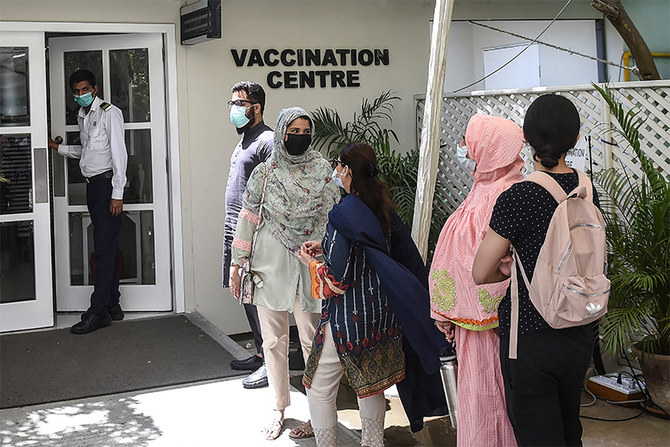ISLAMABAD: Pakistan will take about a decade to vaccinate 75 percent of its population, Bloomberg, an American publication, said in a recently published article about the global disparity between the number of vaccines administered to people in rich and poor countries.
The write-up said more than 46 percent of deaths caused by COVID-19 had taken place in the United States, United Kingdom and the European Union, warning that many nations where the virus was now spreading were “ones where current rates of vaccine rollout won’t result in herd immunity for years, or even decades.”
Based on Bloomberg’s vaccine tracker, the article showed that countries like the US, Britain and Israel were likely to reach the 75 percent target within three months while others like Pakistan were expected to immunize the same level of their population in about a decade.
Germany and France were likely to acquire herd immunity through vaccination in about a year, Argentina in about two and a half years, and India in a little over three years.
The article raised concern over the issue due to the “general indifference to medical problems once they stop bothering rich countries.”
The UK has until now administered at least one dose of vaccine to about 60 percent of its adult population. President Joe Biden’s new administration also aims to vaccinate about 200 million people by the end of this month.
Most underdeveloped countries, however, have even been finding it difficult to get coronavirus vaccines through a UN-sponsored program for low-income countries.
Pakistan received Sinopharm vaccines from China in February and began its immunization drive from its frontline health workers and elderly population.
The country has so far reported 696,184 confirmed coronavirus cases and 14,924 deaths.
While the number of infections has shot up significantly in recent weeks, forcing the authorities to reimpose virus-related restrictions, Pakistan has also witnessed significant vaccine hesitancy that has heightened the risk of the further spread of the virus.
Pakistan will take a decade to vaccinate 75% population — media
https://arab.news/gknnw
Pakistan will take a decade to vaccinate 75% population — media

- According to American publication Bloomberg, India would be able to vaccinate the same percentage of its population in about three years
- Article says virus spreading in nations “where current rates of vaccine rollout won’t result in herd immunity for years, or even decades“
Pakistan president meets UAE counterpart, explores trade, investment opportunities

- Asif Ali Zardari is in UAE on four-day visit to strengthen bilateral ties, review bilateral cooperation
- Both sides discuss regional, international developments, reaffirm commitment to promote peace
ISLAMABAD: President Asif Ali Zardari met his UAE counterpart Sheikh Mohammed bin Zayed Al-Nahyan in Abu Dhabi on Tuesday during which both sides explored new opportunities in trade, investment, energy and other sectors, Zardari's office said.
Zardari arrived in Abu Dhabi on Monday evening with a high-level delegation on a four-day official visit to the UAE to review trade, economic and security cooperation.
"The leaders discussed ways to further deepen the longstanding and brotherly relations between Pakistan and the UAE," a statement from Zardari's office said about his meeting with the UAE president.
"They reviewed the full spectrum of bilateral cooperation and explored new opportunities in trade, investment, energy, infrastructure, technology, and people-to-people exchanges, highlighting the significant potential for expanding economic and strategic partnership.
Zardari highlighted the significance of Al-Nayhan's visit to Pakistan last month, the statement said, expressing appreciation for the UAE's continued support for strengthening bilateral ties.
It said both sides also exchanged views on a range of regional and international developments, reaffirming their commitment to promoting peace, stability and sustainable development.
The meeting was also attended by Pakistan's First Lady Aseefa Bhutto-Zardari, the Pakistani president's son Bilawal Bhutto-Zardari, who is also the chairman of the Pakistan Peoples Party, Interior Minister Mohsin Naqvi and Pakistan's ambassador to the UAE.
ZARDARI MEETS AD PORTS CEO
Zardari earlier met AD Ports Group CEO Captain Mohamed Juma Al-Shamisi to discuss the group's investment initiatives in Karachi.
"Both sides agreed that the expansion and modernization of port infrastructure would strengthen trade flows and support Pakistan’s broader economic development and country’s seaborne trade," the President's Secretariat said in a statement.
It added that Zardari described the AD Ports Group's long-term investment and expanding role in Pakistan's maritime and logistics sector as a key pillar of Pakistan–UAE economic cooperation.
Pakistan and the UAE maintain close political and economic relations, with Abu Dhabi playing a pivotal role in supporting Islamabad during periods of financial stress through deposits, oil facilities and investment commitments.
The UAE is Pakistan's third-largest trading partner, after China and the United States, and a key destination for Pakistani exports, particularly food, textiles and construction services.
The Gulf state is also home to more than 1.5 million Pakistani expatriates, one of the largest overseas Pakistani communities in the world, who contribute billions of dollars annually in remittances, a crucial source of foreign exchange for Pakistan’s economy.
Beyond trade and labor ties, Pakistan and the UAE have steadily expanded defense and security cooperation over the years, including military training, joint exercises and collaboration in counter-terrorism and regional security matters.










